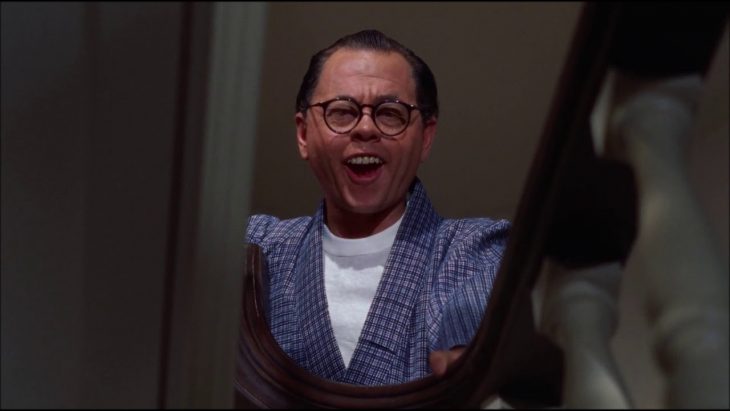
Cancel Culture and Breakfast at Tiffany's
Breakfast at Tiffany’s, based on the original novel by Truman Capote, is a film that shines in the hearts of many even today, nearly 60 years after its release. Directed by Blake Edwards, the film stars Audrey Hepburn as Holly Golightly, a dreamy sort of call girl who lives in New York alongside her upstairs neighbor Paul Varjak, portrayed by George Peppard. While the film is a dramatic romance of a comedy, perhaps an early rom-com, one character in the film was funny to a fault – Mr. Yunioshi.
Mr. Yunioshi is played by Mickey Rooney, who is obviously not Japanese, in makeup and a mouthpiece to accentuate Japanese racial stereotypes of the character. While this yellowface portrayal happened shortly before the civil rights movement in the United States, Breakfast at Tiffany’s is still watched and held by many in high regard today, particularly for Audrey Hepburn’s performance. I experienced a clear moral dilemma watching this film in 2020 as a white male with the casting of Mickey Rooney as Mr. Yunioshi. In the context of the movie, I found myself several times laughing at Mickey Rooney’s performance, as his character is often used specifically as comic relief through the story and Rooney plays a funny character well. However, as I was watching it, there was an overwhelming sense of “I should not be watching this. This should not be happening,” in my head.
There is no way Breakfast at Tiffany’s could be released today with the same portrayal of Mr. Yunioshi – in fact, it would probably still be met with high criticism even if it performed by an actor of Japanese ethnicity. Should, then, we cancel Breakfast at Tiffany’s?
In our society nobody should be surprised when they hear the term “cancel culture” as it has only grown in the past several years. Whether a public figure is cancelled over an old video of them saying something offensive or something unfavorable on their twitter feed (or today, just liking someone else’s post), there is no shortage of reasons to tarnish a public figure’s image. Even on a smaller scale, this sort of environment and culture has made it acceptable for people to hold an almost unforgivable offense against others.
So, what are we supposed to do with Breakfast at Tiffany’s? On the one hand, cancelling the film for the offensive portrayal of Mr. Yunioshi feels bad because the rest of the movie is exceptionally done, especially as the movie has a better packaged story than the original novel. On the other, though, should films be given a pass per say because of the ignorant, albeit unacceptable, cultural perspective during which they were released?
I was presented with a parallel predicament as I was writing a short story over the summer with the intentions of filming it as a short film. The main character of the story is an average high school student that doesn’t cross any lines of immorality any more than his classmates do, one example being where he makes fun of his online friend’s name. While it never becomes a major plot point, I called my sister to ask her about possible names for the friend as I hadn’t decided yet what I wanted the character to be named and her husband is Chinese. When talking to her about possible names, she was concerned about Chinese culture or a Chinese name being the subject of a joke in my story until I assured her the main character making the joke was not going to be portrayed in an acceptable fashion and would not get a happy ending. After our discussion, however, I considered just cutting the character out of the story entirely, asking myself the question if it was okay for me to make a joke that wasn’t relevant to the main storyline at the expense of Chinese culture? Would Chinese readers/viewers have found it offensive if the only representation they got in my story was making fun of a name?
Regardless, modern showings of Breakfast at Tiffany’s are left to reconcile the cultural offense that is Mickey Rooney’s Mr. Yunioshi. My instinct is to sweep his performance under the rug, so I can recommend the movie to others and appreciate the rest of the story. However, it would be equally ignorant and offensive for me to support such a portrayal of Japanese stereotypes.